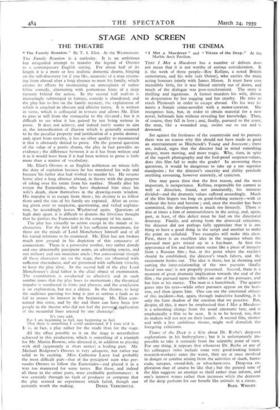STAGE AND SCREEN
THE THEATRE
" The Family Reunion." By T. S. Eliot. At the Westminster.
The Family Reunion is a curiosity. It is an ambitious but misguided attempt to transfer the legend of Orestes to a contemporary English setting. For about half of its length it is a more or less realistic domestic drama, hinging on the self-discovery (or if you like, neurosis) of a man return- ing from abroad after a long absence to meet his family, which creates its effects by maintaining an atmosphere of rather feline comedy, alternating with portentous hints of a deep mystery behind the action. In the second half realism is increasingly submerged in fantasy, comedy is abandoned, and the play has to live on the family mystery, the explanation of which is couched in obscure and allusive terms. It is written in verse, which is colloquial in texture and allows Mr. Eliot to pass at will from the vernacular to the elevated ; but it is difficult to see what it has gained by not being written in prose. It does not achieve, and indeed rarely seems to aim at, the intensification of illusion which is generally assumed to be the peculiar property and justification of a poetic drama ; and, apart from novelty, it has no other quality to recommend it that is obviously denied to prose. On the general question of the value of a poetic drama, the play in fact provides no evidence ; the difference between it as it has been written and it as it would have been if it had been written in prose is little more than a matter of vocabulary.
Mr. Eliot's Orestes is an English nobleman on whom falls the duty of expiation because he has murdered his wife and because his father also had wished to murder his. He returns home after a long absence abroad, in theory with the purpose of taking over his estate from his mother. Shortly after his return the Eumenides, who have shadowed him since his wife's death, show themselves in the drawing-room window. His impulse is to escape from them ; his destiny is to follow them until the sins of his family are expiated. After an even- ing given over to suspicion, questioning, and veiled explana- tion, he accordingly leaves Wychwood again. Questions of high duty apart, it is difficult to dismiss the frivolous thought that he prefers the Eumenides to the company of his aunts.
The play has virtually no action except in the minds of its characters. For the first half it has sufficient momentum, for there are the minds of Lord Monchensey himself and of all his varied relations to be examined. Mr. Eliot has not broken much new ground in his depiction of this concourse of connections. There is a possessive mother, two rather dowdy and one abnormally percipient aunts, an admiring cousin, and one military and one mundane uncle ; but conventional though all these characters are on the stage, they are observed with sufficient shrewdness, and are presented with sufficient vivacity, to keep the play alive. In the second half of the play Lord Monchensey's dead father is the chief object of examination. The examination is conducted so allusively and in such sombre tones that the play loses its momentum ; the theatrical impulse is smothered in hints and phrases, and the conclusion is an explanation, but not a climax. In the theatre, to keep the audience guessing too long is just as serious a fault as to fail to arouse its interest in the beginning. Mr. Eliot com- mitted this error, and by the end there can have been few people in the theatre who did not feel the persona!, applicatioh of the mournful lines uttered by " one character It's very odd, But I am beginning to feel, just beginning to feel, That there is something I could understand, if I were told it. It is, in fact, a play rather for the study than for the stage. All the effect possible to it on the stage is nevertheless achieved in this production, which is something of a triumph for Mr. Martin Browne, who directed it, in addition to playing with skill (apparently at short notice) a leading part. Mr. Michael Redgrave's Orestes is very adequate, but rather too solid to be exciting. Miss Catherine Lacey had probably the most difficult part—that of the percipient aunt who per- suades Orestes to follow the Eumenides—and played it in a way too mannered for some tastes. But these, and indeed
all those in the other parts, were creditable performances : it was certainly through no fault of producer or company that the play seemed an experiment which failed, though one














































 Previous page
Previous page